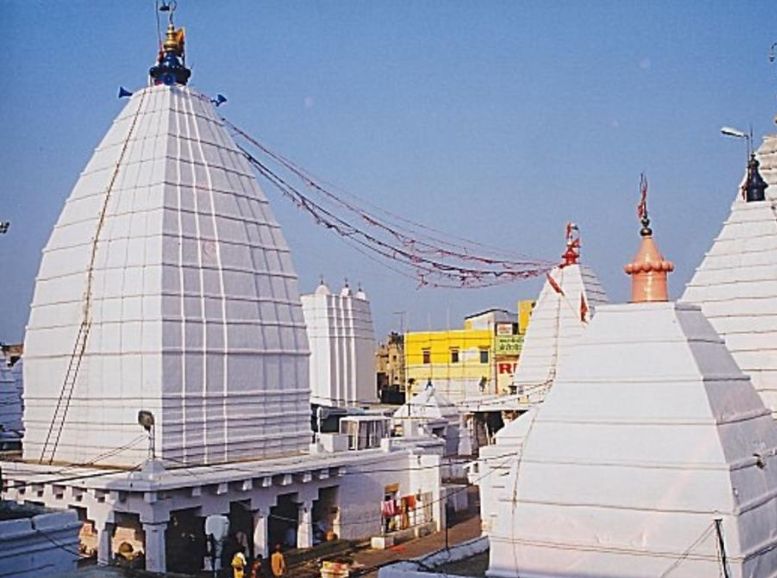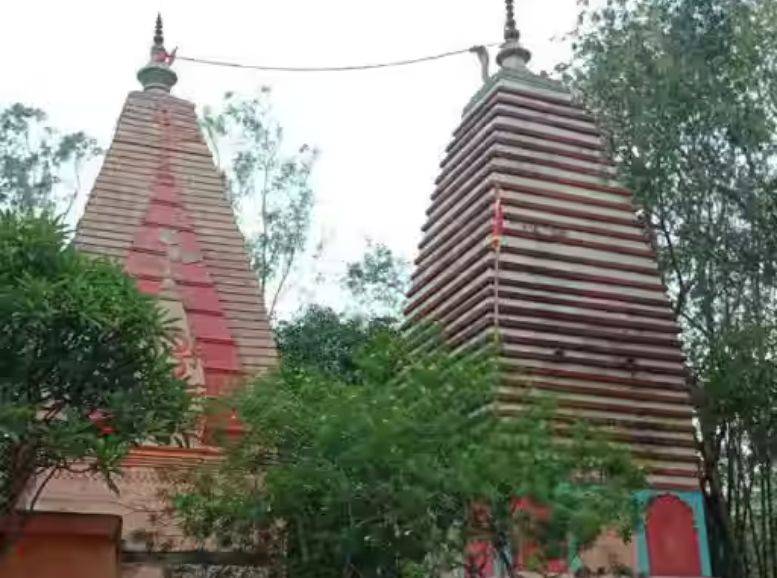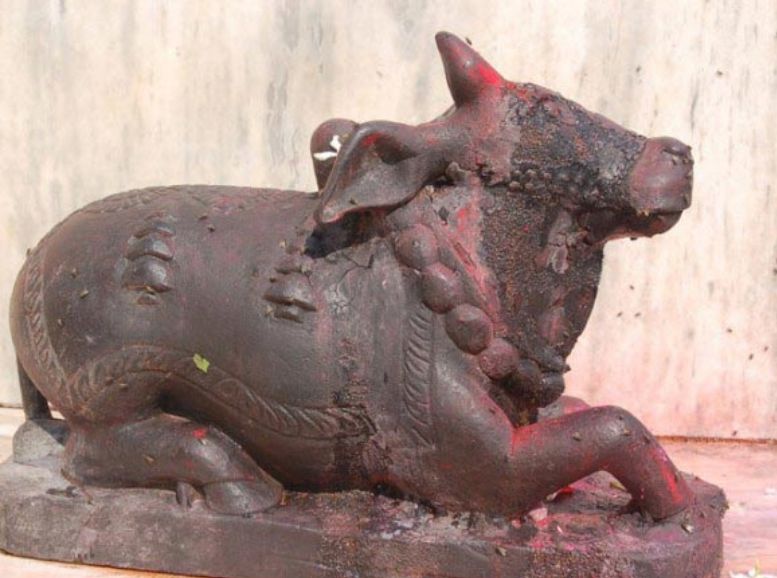Steeped in the spiritual heart of Deoghar, Jharkhand, the Baidyanath Jyotirlinga Temple thrums with a unique energy. A dazzling testament to both faith and architectural mastery, it stands as one of the twelve revered Jyotirlingas, sacred abodes of Lord Shiva. Devotees and travelers alike flock to this site, drawn by the promise of blessings and a glimpse into its rich tapestry of history. But the Baidyanath Jyotirlinga, also known as Baba Dham, transcends its role as a temple. It’s a vibrant crossroads where devotion, history, and culture intertwine, forming a cornerstone of Hindu spirituality for centuries.
The temple complex itself is a masterpiece. Ancient stone walls whisper tales of the past, their surfaces adorned with intricate carvings. The air hums with the collective murmur of chants and prayers offered by devotees, weaving a spell of profound reverence.
How to reach:
By Air:
- Deoghar Airport (DGH): This is the closest airport, just 8 kilometers from the temple. While relatively new with limited flights, it offers connections to major cities like Delhi, Ranchi, and Patna. Taxis and local buses are readily available for the short trip to the temple.
- Patna Airport (PAT): A larger international airport 230 kilometers away, Patna offers more frequent flights from major Indian cities. From Patna, you can take a taxi, bus, or train to Deoghar. Jasidih Junction, closer to Deoghar, is a convenient train station option.
By Train:
- Jasidih Junction (JSME): Situated just 7 kilometers away, this is the closest railway station. Jasidih Junction boasts excellent connectivity with major cities like Kolkata, Delhi, Mumbai, and Varanasi. Auto-rickshaws, taxis, and local buses are available for the short ride to the temple.
- Deoghar Railway Station: While offering fewer train services, this station is still a convenient option 4 kilometers from the temple if you find a direct train.
By Road:
Deoghar enjoys good road connectivity to various cities. Here are some popular routes:
- Ranchi (270 kilometers): State-run and private buses, along with taxis, provide comfortable travel options. Expect a journey of 6-7 hours.
- Patna (230 kilometers): Buses and taxis are readily available for the 5-6 hour trip.
- Kolkata (370 kilometers): Direct buses and taxis are available, with the journey typically taking 8-9 hours.
Best time to visit:
- Pleasant Winters (October to March): This is widely considered the ideal time to visit Baidyanath Jyotirlinga Temple. The weather is delightful, with cool breezes and comfortable temperatures ranging from 10°C to 25°C (50°F to 77°F). These pleasant conditions make sightseeing and participating in temple rituals a breeze, without the discomfort of scorching heat or heavy rain.
- Hot Summers (April to June): Deoghar experiences quite toasty summers, with temperatures reaching up to 40°C (104°F). While the temple remains open year-round, the sweltering heat can make daytime visits less enjoyable. If you must visit during this time, aim for early mornings or late evenings for a more comfortable experience.
- Monsoon Magic (July to September): The monsoon season brings moderate to heavy rainfall to Deoghar. While the rain adds a certain charm to the landscape, it can also disrupt travel plans and make getting around more challenging. However, on the flip side, the lush greenery that emerges during the monsoon paints a truly picturesque scene.
Attractions:
Baidyanath Jyotirlinga Temple:

In the heart of Deoghar, Jharkhand, lies more than just a temple; it’s a radiant embodiment of faith. The Baidyanath Jyotirlinga Temple, one of the twelve sacred Jyotirlingas dedicated to Lord Shiva, beckons pilgrims and travelers alike. Intricate carvings etched into the very stones whisper tales of India’s rich artistic heritage and unwavering devotion. Within the sanctum sanctorum, the revered Shiva Lingam emanates a powerful presence, drawing devotees seeking blessings and spiritual solace.
The daily aarti (prayer ceremony) is a sensory experience unlike any other. Melodious chants fill the air, mingling with the sweet scent of incense, creating a tapestry of profound reverence. The temple complex itself throbs with life, especially during the auspicious month of Shravan.
Parvati Temple:

Just steps from the imposing Baidyanath Jyotirlinga shrine lies the Parvati Temple, a serene oasis dedicated to Lord Shiva’s consort, Parvati. This temple transcends mere structure; it embodies the divine union of Shiva and Parvati, a potent symbol of balance and cosmic harmony. Stepping inside, a sense of calm washes over you, inviting quiet reflection and heartfelt prayer.
The architecture here echoes the grandeur of the main shrine. Intricate carvings adorn the walls, whispering tales of unwavering devotion. The overall ambiance is one of serenity, a perfect complement to the powerful energy of the Jyotirlinga. Devotees often seek blessings for marital bliss and harmony in their lives, and the temple truly comes alive during festivals like Teej and Navratri.
Nandi Bull:

Standing guard within the temple complex is a powerful presence: the statue of Nandi, the sacred bull and Lord Shiva’s loyal companion. In Hindu tradition, Nandi transcends being a mere vehicle; he embodies unwavering devotion and strength, a constant by Shiva’s side. Devotees, seeking a deeper connection, often whisper their wishes into Nandi’s ears, believing them carried directly to the divine. The statue, frequently adorned with vibrant garlands and offerings, stands as a testament to this enduring faith.
Local Experiences:
Kanwar Yatra: Join millions in a soul-stirring pilgrimage during Shravan. Carry holy water on the Kanwar Yatra, a vibrant journey of faith culminating at the Baidyanath Jyotirlinga Temple.
Culinary Delights: Deoghar’s cuisine is a treat for your taste buds. Savor traditional sweets like peda and tilkut, or indulge in street food specialties like kachori-sabzi and litti-chokha.
Festival Extravaganza: Immerse yourself in the cultural tapestry of Deoghar. Witness vibrant processions, rituals, and performances during festivals like Maha Shivaratri, Durga Puja, and Diwali at Baidyanath Jyotirlinga Temple.
Market Treasures: Explore bustling markets like Tower Chowk and Bada Bazar. Browse local handicrafts, religious artifacts, and delectable snacks and sweets.
Inner Peace Retreats: Seek serenity at meditation and yoga retreats like Satsang Ashram. Participate in sessions, workshops, and holistic living programs at Baidyanath Jyotirlinga Temple.
Tribal Encounters: Venture into nearby villages and connect with indigenous communities. Learn about their unique culture, crafts, and way of life.
Nature’s Embrace: Embark on nature walks or treks. Explore scenic trails at Tapovan Caves and Trikut Hill, enveloped by lush greenery, ancient caves, and breathtaking vistas.
Spiritual Enlightenment: Attend insightful sessions on Hindu philosophy, meditation, and spiritual practices. Learn from renowned leaders and scholars.
Travel tips:
Do your research: Before your trip, check temple timings, upcoming festivals, and weather forecasts for Deoghar.
Dress modestly: As Deoghar is a religious destination, respectful attire is essential for temples and sacred sites. Opt for covered shoulders and knees.
Stay hydrated: Deoghar, especially during summers, can be hot. Carry a reusable water bottle to stay hydrated while exploring.
Temple footwear: Many temples require removing shoes. Pack socks and a small bag to carry your footwear.
Respectful behavior: Be mindful of local customs. Remove footwear in temples and avoid photography in prohibited areas.
Be aware: Deoghar is generally safe, but staying aware of your surroundings and belongings is crucial, especially in crowded areas.
Consider travel insurance: It’s wise to have travel insurance for unexpected situations.
Cash is king: While ATMs exist, carrying cash, particularly smaller denominations, is recommended.
Local transport: Auto and cycle rickshaws are common. Negotiate fares for autos or choose metered ones for fair pricing.
Respectful photography: Always seek permission before photographing people, especially locals and devotees at temples and festivals.
Pack essentials: Carry any medications you require and a first-aid kit, especially if you have pre-existing medical conditions.
Basic language skills: While Hindi is widely spoken, knowing a few local phrases can be helpful for interacting with locals.
Conclusion
In Deoghar, a journey transcends a spiritual retreat, offering a profound immersion into the region’s vibrant culture, breathtaking nature, and delectable cuisine. The iconic Baidyanath Jyotirlinga Temple stands at the heart of this experience, where visitors can partake in sacred rituals, explore ancient caves, and engage with the rich local traditions. From participating in the colorful Kanwar Yatra to savoring the flavors of traditional dishes, every moment in Deoghar is a testament to the richness of India’s spiritual and cultural tapestry. Plan your transformative pilgrimage with Xplro.com, your comprehensive travel guide to navigating the city, understanding local customs, and embarking on a journey that will leave you with cherished memories and a deeper understanding of the spiritual essence that permeates this sacred land. Whether seeking solace, adventure, or cultural immersion, Deoghar beckons with open arms. Let Xplro.com be your guide as you discover the beauty of devotion and the timeless allure of the divine.
FAQs
- What is the significance of Baidyanath Jyotirlinga Temple?
- The Baidyanath Jyotirlinga Temple is one of the twelve sacred Jyotirlingas of Lord Shiva, revered by Hindus as a powerful symbol of divine energy and spiritual enlightenment.
- When is the suggested time to visit Baidyanath Jyotirlinga?
- The ideal time to visit Baidyanath Jyotirlinga is during the winter months from October to March when the weather is pleasant and ideal for sightseeing and temple visits.
- How can I get to Baidyanath Jyotirlinga Temple?
- Baidyanath Jyotirlinga Temple is accessible by air, rail, and road. The nearest airport is Deoghar Airport (DGH), and the nearest railway station is Jasidih Junction (JSME). It is well-connected by road to major cities in Jharkhand and neighboring states.
- What are the main attractions in Deoghar?
- The main attractions in Deoghar include the Baidyanath Jyotirlinga Temple, Parvati Temple, Nandi Bull statue, Basukinath Temple, Tapovan Caves and Hills, and Naulakha Mandir, among others.
- Are there any local festivals celebrated in Deoghar?
- Yes, Deoghar celebrates various festivals such as Maha Shivaratri, Durga Puja, Diwali, and the Kanwar Yatra, which is especially significant during the month of Shravan.
- What is the Kanwar Yatra, and when does it take place?
- The Kanwar Yatra is an annual pilgrimage where devotees, known as Kanwariyas, carry holy water from the Ganges River to offer at the Baidyanath Jyotirlinga Temple. It usually takes place during the month of Shravan (July-August).
- Are there any local delicacies to try in Deoghar?
- Yes, Deoghar offers a variety of local delicacies such as peda, tilkut, kachori-sabzi, litti-chokha, and more, which are must-try for visitors.
- What should I wear when visiting Baidyanath Jyotirlinga Temple in Deoghar?
- It is advisable to dress modestly and respectfully when visiting temples in Deoghar, avoiding revealing clothing.
- Are there any precautions to take while visiting Deoghar?
- While Deoghar is generally safe for tourists, it’s essential to stay aware of your surroundings, keep belongings secure, and respect local customs and traditions.
- Can I engage in adventure activities in Deoghar?
- Yes, Deoghar offers opportunities for nature walks, trekking, and adventure activities, especially at places like Tapovan Caves and Trikut Hill.
- Is it necessary to book accommodation in advance?
- During peak seasons, it is advisable to book accommodation in advance to ensure availability, especially if you plan to visit during festivals or the Kanwar Yatra.
- What should I do in case of emergencies?
- Keep a list of emergency contact numbers, including local authorities, your embassy or consulate, and your accommodation provider, and consider purchasing travel insurance for any unexpected events.





